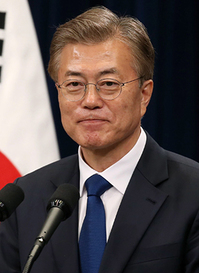
This week the South Korean National Election Commission announced that Democratic Party candidate Moon Jae-in had been elected as the new President.
Moon succeeds former President Park Geun-hye who was removed from office by the country's top court in March over a wide-ranging corruption scandal and subsequently indicted on a range of charges including bribery and extortion.

The new President has expressed a willingness to engage in dialogue with North Korea and spoken of his reservations about the U.S. made THAAD missile system, the installation of which resulted in an increase in tension with China.
While Moon has acknowledged that the U.S. remains South Korea's key partner, any new approach in dealing with North Korea, THAAD, along with the possibility of renegotiating the terms of the KORUS Free Trade Agreement, could potentially rattle relations with the U.S.
What does it mean for the economy?
Global property consultant CBRE expects Moon's administration to gradually introduce new financial policies in order to stabilize the financial market and support the economic recovery. A major overhaul of monetary policy is unlikely. The Bank of Korea's base rate is likely to remain relatively unchanged amid recent signs of economic recovery and the increasing influx of foreign capital.
However, there is a need for a change in interest rates to address the high levels of household debt and support small loan finance. To
South Korea President Moon Jae in
resolve excessive household debt, which stood at KRW 1,344 trillion as of April 2017, the new administration is expected to implement a stricter Debt Service Ratio over the current Debt to Income ratio, says CBRE.
During his campaign Moon stressed reforming chaebols (large domestic conglomerates) would be one of his key objectives. His administration is expected to repeal corporate tax benefits and raise the corporate tax rate to 25% to fund his pledge to increase social welfare spending. He has also vowed to root out collusion between conglomerates and politicians; introduce punitive damage suits and strengthen minority shareholders' rights to claim compensation; and introduce cumulative electronic voting as a means to strengthen transparency and democratic management.
What does it mean for real estate?
CBRE expects Moon's administration to have a mixed impact on the domestic real estate market, with the office sector the clear beneficiary.
Office: Moon's pledge to focus on the fourth industrial revolution and establish an ecosystem of startups as a new growth engine will boost investment in tech related industries and create new office leasing demand.
Retail and Hospitality: Improved relations with China could trigger a recovery in inbound tourism and benefit retailers and hotel operators. However, Moon has also pledged to implement restrictions on shopping malls operated by conglomerates in order to protect small and private businesses, which could negatively impact the retail sector.
Residential: New policies directed at the real estate market are expected to focus on managing the residential sector rather than the commercial market.
Investment: Reduced tension with North Korea should help attract more foreign investors to South Korea. However, the new administration is expected to increase taxes on property holdings, which is likely to increase the cost of investment.
Partner source : https://shar.es/1RGSCF
WORLD PROPERTY JOURNAL


